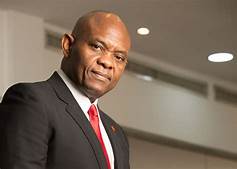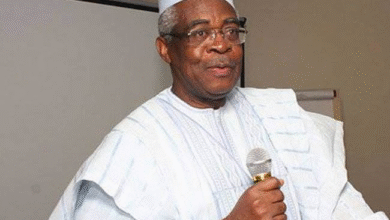Tony Elumelu’s Billions: How Did This Banker Get So Rich?

.Tony Elumelu is a highly influential Nigerian economist, banker, and philanthropist who has profoundly impacted Africa’s business landscape. As the founder of the Tony Elumelu Foundation and chairman of Heirs Holdings and Transcorp Group, Elumelu’s reach extends far beyond the corporate world. His philosophy of “Africapitalism” emphasizes the private sector’s role in driving Africa’s economic growth and social development, positioning entrepreneurs as key agents of change. Through his foundation, Elumelu has empowered thousands of African entrepreneurs, providing them with funding, training, and mentorship to create successful businesses that generate jobs and drive economic transformation. However ,while his career has been marked by notable achievements, Elumelu has also faced controversies concerning his stupendous wealth.
Bode George, a prominent PDP chieftain, at a point in time ignited a firestorm with his scathing critique of Nigerian bankers’ wealth accumulation. Targeting CEOs like Tony Elumelu of UBA and Herbert Wigwe of Access Bank, George alleged that these bankers amassed their fortunes through dubious means, including corruption and exploiting loopholes in the system. He questioned the legitimacy of their wealth, pointing to their lavish lifestyles, private jets, and luxury flights as evidence of their ill-gotten gains.
The lamentation of George may not be farfetched. In the midst of Nigeria’s economic woes, a provocative question lingers: how do Nigerian bankers amass such staggering wealth? Bode George’s scathing critique of the banking elite has ignited a long-overdue conversation about the opaque world of high finance, where fortunes are made and the lines between legitimate business and corruption are often blurred. As the nation grapples with poverty, inequality, and economic instability, the ostentatious displays of wealth by bank few banking chiefs raise uncomfortable questions about the sources of their riches and the moral fabric of Nigeria’s financial sector.
George’s accusations ,indeed, sparked a national debate, with some defending the bankers’ legitimate business practices and others calling for greater transparency and accountability in the industry. While some argue that bankers like Elumelu have built their wealth through shrewd investments, dividend income, and value creation, others believe that their wealth is a result of exploiting the system.
Elumelu’s Networth
Elumelu’s business empire extends beyond banking. His wealth is diversified across various assets, including equity holdings, real estate, private equity, and venture capital , with investments in the energy sector through Heirs Energies, and a portfolio of luxury properties in Lagos, Abuja, London, and Dubai.
No doubt about it , Elumelu is stupendously rich. With an estimated net worth ranging from $1 billion to $2.15 billion. His significant stakes in United Bank for Africa (UBA) and Transcorp Group have contributed substantially to his fortune, solidifying his position as a leading figure in Nigeria’s financial sector.Tony Elumelu’s total net worth is estimated to be around $2.15 billion, comprising various assets including $125 million in Transcorp PLC, $63.69 million in UBA, $1.75 billion in Heirs Energies, $28 million in Heirs Insurance, $61.5 million in United Capital, and $75 million in real estate, with $50 million in cash holdings. This diverse portfolio reflects his extensive business interests and investments across multiple sectors.
With this enoourmous wealth, Elumelu has decided to be selfless too .His commitment to empowering African entrepreneurs is evident through the Tony Elumelu Foundation, which has supported over 18,000 start-ups across the continent. As a visionary leader and philanthropist, Elumelu’s impact goes beyond his financial success, driving economic growth and development in Africa through his business ventures and initiatives.
The question on many minds is: How did Tony Elumelu accumulate his wealth? Public opinion is divided, with some scrutinizing the origins of his fortune and others acknowledging his business acumen and entrepreneurial achievements. Elumelu’s journey to becoming a prominent figure in African business has sparked debate, with some questioning the legitimacy of his wealth and others recognizing his philanthropic efforts and contributions to the African economy through the Tony Elumelu Foundation.
Elumelu From the Lens of His Admirers
Tony Elumelu’s admirers believe his wealth is a well-deserved reward for his hard, intelligence work and dedication. As outlined by Clay Christensen in his book: “The Innovator’s DNA”, to them ,he embodies the qualities of a leader who thinks differently. Tony Elumelu exemplifies the qualities of a visionary leader and innovator, leveraging his unique approach to drive success in his business ventures and philanthropic efforts. By embracing the five key habits of mind—associating, questioning, observing, networking, and experimenting—Elumelu has built a diversified business empire that spans multiple sectors, including banking, energy, and hospitality.
First, Elumelu’s ability to associate and connect seemingly unconnected things is evident in his diversified business empire. He has invested in various sectors, including banking, energy, hospitality, and real estate. This venture demonstrates his ability to identify opportunities and connect the dots between different industries.
Moreover, Elumelu’s leadership style is characterized by a willingness to question the status quo and challenge conventional wisdom. His vision for a pan-African bank that serves the needs of individuals and businesses across the continent set UBA apart from its competitors.
Elumelu’s ability to observe and identify opportunities is evident in his early adoption of innovative business models. He recognized the potential for growth in Africa and invested in various sectors, including energy and hospitality. This forward-thinking approach has been instrumental in the success of his business ventures.
Furthermore, Elumelu’s networking skills are reflected in his ability to build relationships and pick up ideas. He is a member of various global organizations and has partnerships with other companies. These connections have enabled him to stay ahead of the curve and identify new opportunities.
Additionally, Elumelu’s willingness to experiment and take calculated risks is evident in his business ventures. He has diversified his investments into various sectors, including real estate and private equity. This experimentation has allowed him to identify new opportunities and stay ahead of the competition.
By promoting entrepreneurship, innovation, and social impact, Elumelu is driving positive change and contributing to economic growth and development in Africa. His legacy serves as a powerful inspiration for leaders and entrepreneurs looking to make a meaningful impact in Africa and beyond, demonstrating the potential for business and philanthropy to intersect and create lasting value.
Elumelu From the Critics Lens
But that is not end of the story. Elumelu’s career and business dealings have not been without any controversy. Moreover , his critics appear very uncomfortable with the above narrative. They queried his intellectual capability that yielded his humongous wealth . A question often touted by some analysts remains: where did Elumelu gather the above sterling qualities. They often queried his intellectual base . Surely ,his adversaries would not subscribe to that or agree with any claim above .
The reason for this may not be farfetched .Tony’s humble academic beginnings are allegedly a sensitive topic . One of the most enduring controversies surrounding Elumelu is the debate over his class of degree from Ambrose Ali University, Ekpoma. Critics claim that he graduated with a third-class degree, which has sparked intense speculation and debate. While Elumelu has neither confirmed nor denied this claim, the controversy has raised questions about the relationship between academic credentials and business success. Sources claim that whenever a journalist inquires about his academic background, his associates swiftly intervene to steer the conversation away from Ambrose Ali University, Ekpoma, and toward more prestigious institutions. The reason, allegedly, is tied to issues of self-esteem and his alleged third-class degree in Economics.
Sequel to the above, his adversaries believed he was just lucky or smart .This gives birth to another round of controversy around his stupendous wealth: how he bought over Crystal Bank which renamed Standard Trust Bank . Elumelu’s acquisition of Crystal Bank, which he later renamed Standard Trust Bank, has been hailed as a masterstroke by some and criticized as a lucky break by others. Detractors argue that the bank was acquired at a cheap price and that regulatory authorities were negligent in their oversight. This allegation is further boosted by the meteoric rise of Standard Trust Bank from 1997 to 1999 .
In a revealing interview, Victor Ogiemwonyin, former CEO of Partnership Investments Co Ltd, shed light on the remarkable five-fold growth of Standard Trust Bank (STB) between 1997 and 1999. According to Ogiemwonyin, two key factors drove this explosive growth. Firstly, the strategic acquisition of Crystal Bank was a game-changer for STB. Secondly, Crystal Bank’s undervaluation due to its financial struggles presented a lucrative opportunity. The bank’s deposits were undervalued, with the regulatory authorities selling depositors at a mere 30 kobo to N1, creating the fears of the bank’s impending collapse.
Ogiemwonyin pointed to the Central Bank of Nigeria’s (CBN) inaction as a lender of last resort and its misinterpretation of short-term liquidity issues as solvency problems, which exacerbated Crystal Bank’s troubles. This perfect storm of circumstances ultimately paved the way for STB’s meteoric rise. The controversy surrounding this acquisition highlights the complex interplay of luck, circumstance, and strategic decision-making in entrepreneurial success.
Tony Elumelu, a prominent Nigerian economist, banker, and philanthropist, also faced criticisms surrounding the transparency of major banking mergers and the performance of his ventures in sectors like energy. Elumelu’s involvement in the United Bank for Africa (UBA) merger with Standard Trust Bank also raised concerns about transparency, with some critics alleging insider dealings and lack of transparency. However, no formal charges were brought against him.
Consequently, some critics usually attribute Tony Elumelu’s success to being “just smart”. Another issue related to this allegation was the contentious business dealings with fellow Nigerian businessman Femi Otedola as evidence. Their dispute centers around Otedola’s accusations that Elumelu betrayed him and engaged in irregularities in Transcorp, where Elumelu serves as chairman. This high-profile conflict highlights the intricacies and challenges of navigating complex business relationships, where transparency and trust are paramount
Despite the above controversies , Elumelu has proved a valuable point to the youths ;:though academic excellence is often viewed as a key determinant of success, but its limits are evident in various aspects of life, particularly in the business world ;while academic achievements can provide a solid foundation, they don’t guarantee success .
The notion that academic excellence is the sole determinant of success has been debunked by numerous examples of entrepreneurs who have achieved stupendous wealth without formal education. Visionaries like Richard Branson, Steve Jobs, and Mark Zuckerberg have proven that innovation, hard work, and determination can be more important than academic credentials. These individuals have leveraged their unique perspectives, creativity, and risk-taking abilities to build empires that have transformed industries and created lasting impact.
The stories of Henry Ford, Walt Disney, and Li Ka-shing further reinforce the idea that success is not exclusively tied to academic excellence. These trailblazers have demonstrated that entrepreneurial spirit, resilience, and adaptability can be just as valuable as academic achievements. As the world becomes increasingly complex and dynamic, it’s clear that success can be achieved through various paths. By recognizing and celebrating the diverse routes to success, we can foster a more inclusive and supportive environment that encourages innovation, creativity, and entrepreneurship, ultimately leading to greater prosperity and progress.
Tony Elumelu’s tenure as Managing Director/CEO of United Bank for Africa (UBA) from 2005 to 2010 regarded as a transformative period for the bank confirmed his adimirers’ views . Elumelu led the strategic merger of Standard Trust Bank (STB) with UBA in 2005. He then drove the bank’s aggressive expansion across Africa, establishing subsidiaries in over 20 countries and opening operations in major financial hubs like New York, London, and Paris. Under Elumelu’s leadership, UBA became a leading pan-African financial institution, with a strong presence across the continent. His vision positioned the bank for long-term success, leveraging the growth potential of Africa’s diverse economies.
Elumelu’s leadership and strategic decisions had a lasting impact on UBA, cementing its status as a major player in African banking.
Moreover , though the above suspicions and allegations are normal , there is no concrete evidence against Elumelu. For this singular reason , The Decisionmakers believes Elumelu’s journey to success testament to his innovative leadership style, business acumen, and commitment to empowering others. While controversies have surrounded his career and business dealings, his achievements and impact in the business world are undeniable. His story serves as a testament to the importance of innovative thinking, risk-taking, and vision in achieving success, and highlights that academic excellence is not the only factor that determines one’s potential for success.
Elumelu’s story challenges the conventional notion that academic excellence is the primary determinant of success. Instead, it highlights the importance of innovative thinking, risk-taking, and vision in achieving success. His ability to associate and connect seemingly unconnected things, question the status quo, and experiment with new ideas has enabled him to build a successful business empire and drive innovation in various sectors.
Tony Elumelu’s legacy is one of innovation, entrepreneurship, and philanthropy. His story serves as a testament to the power of innovative thinking and risk-taking in achieving success. As a role model for entrepreneurs and business leaders, Elumelu’s journey offers valuable lessons and inspiration for those seeking to make a lasting impact in their industries and communities.
Tony Elumelu’s life is an inspiring narrative of how one person can influence not just an industry, but a continent’s future. His story encourages young Africans to dream big, work hard, and, most importantly, remember that true success is measured by the lives you change, not just the wealth you accumulate. In Elumelu, Africa sees not just a businessman but a visionary leader committed to a better future for all




